|
|
|
Sort Order |
|
|
|
Items / Page
|
|
|
|
|
|
|
| Srl | Item |
| 1 |
ID:
139777
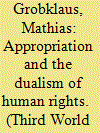

|
|
|
|
|
| Summary/Abstract |
This paper conceptualises appropriation as an analytical tool to capture the contradictory nature of human rights localisation. Here appropriation is understood as the intentional reinterpretation of ideas across cultural, spatial and temporal contexts aimed at definitional power. In the first part of the paper I lay out the concept and develop an operationalisation. In the second part I apply the framework to the case of contested gender reform in Nigeria. The analysis highlights the localisation of human rights norms as an amalgam of different competing appropriating acts, leading to a hybrid and contradictory outcome that bears both transformative and stabilising potential.
|
|
|
|
|
|
|
|
|
|
|
|
|
|
|
|
| 2 |
ID:
139772


|
|
|
|
|
| Summary/Abstract |
This paper explores the politics of monitoring at the Universal Periodic Review (UPR), a new United Nations human rights monitoring mechanism which aims to promote a universal approach and equal treatment when reviewing each country’s human rights situation. To what extent are these laudable aims realised, and realisable, given entrenched representations of the West and the Rest as well as geopolitical and economic inequalities both historically and in the present? Based on ethnographic fieldwork at the UN in 2010–11, the final year of the UPR’s first cycle, we explore how these aims were both pursued and subverted, paying attention to two distinct ways of talking about the UPR: first, as a learning culture in which UN member states ‘share best practice’ and engage in constructive criticism; and second, as an exam which UN member states face as students with vastly differing attitudes and competences. Accounts and experiences of diplomats from states that are not placed in the ‘good students’ category offer valuable insights into the inherent contradictions of de-historicised and de-contextualised approaches to human rights.
|
|
|
|
|
|
|
|
|
|
|
|
|
|
|
|
| 3 |
ID:
139770
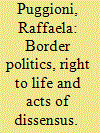

|
|
|
|
|
| Summary/Abstract |
The debate on migration-related border controls has greatly expanded during the past decade. Special attention has been given to processes of contestation and of rights-claims enacted by migrants, drawing greatly on Isin’s work on acts of citizenship and Rancière’s articulation of the ‘uncounted’ and the political. Within this broad debate little attention has been devoted to the acts of common people in contesting current border management and especially in refusing the policing and the bordering of their own territory. By focusing on the Lampedusa borderland, this paper will explore and interrogate the verbal protests made by the people of Lampedusa in response to the drowning of some 366 African migrants on 3 October 2013. The protests were mostly against current border patrolling and its politics of (non-)life, which prioritise border protection against (migrants’) life protection. The call to protecting all human life, equally worthy of being protected, transformed these protests into political acts. Using and extending the work of Rancière, I explore the extent to which the people of Lampedusa have highlighted a ‘wrong’ and enacted ‘dissensus’ by contesting the (natural) securitised order of EU border management.
|
|
|
|
|
|
|
|
|
|
|
|
|
|
|
|
| 4 |
ID:
139769
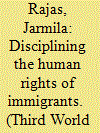

|
|
|
|
|
| Summary/Abstract |
This paper investigates the technologies of controlling migration and how the human rights of third-country nationals are disciplined and limited in many European Union member states. It discusses the rationalities of allowing entry as they are inscribed in the Schengen visa regulations and in the regulations relating to resident permits and family reunification rights in various European countries. Specifically the paper sheds light on how market veridiction results in the disciplining of human rights in these policies. The analysis is conducted through a Foucauldian governmentality framework entailing an analysis of the problematisations of immigration through market veridiction and how these are applied today to limit immigrants’ human rights. The paper then compares these rationalities to eugenic justifications for problematising immigration in the USA from 1860s onwards. This historical comparison shows how social Darwinist notions of human worth continue to function at the level of rationalities and technologies of disciplining immigrants’ human rights. The paper concludes that market veridiction makes human rights function inside a framework of (e)quality in which human worth is calculated as ‘quality’ and not as ‘equality’, and shows how migrants’ human rights are made to function as something to be earned rather than something inherent or inalienable.
|
|
|
|
|
|
|
|
|
|
|
|
|
|
|
|
| 5 |
ID:
139771
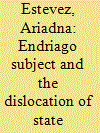

|
|
|
|
|
| Summary/Abstract |
Mexico is arguably immersed in an unprecedented wave of violence in which drug cartels and law enforcement officials at times work together in cases of forced disappearance, kidnapping, execution, torture, persecution and other atrocities considered violations of the most basic human rights, including the right to life and to physical integrity. However, these atrocities are only classified as human rights violations if they can be unequivocally attributed to the state; this is not always possible. Using Foucault’s idea of governmentality and Valencia’s concept of the Endriago as a subjectivity emerging from the specific governmentalisation of the Mexican state, this article examines how hybrid agents in Mexico – law enforcement officials working for criminal gangs or criminals working for the state – serve to subvert common understandings of attribution and responsibility in the state-centric discourse of human rights in general, and of the right of asylum in the specific case of Canada, a country to which thousands of Mexicans have fled.
|
|
|
|
|
|
|
|
|
|
|
|
|
|
|
|
| 6 |
ID:
139767


|
|
|
|
|
| Summary/Abstract |
Critics of human rights are hesitant to reject them outright for fear of undermining the work they may do in resisting oppression. This pragmatic justification is central to celebrations of human rights as well, but is it more than a failure to move beyond liberal hegemony? I argue that human rights have radical potential because the act of claiming such rights uses the ambiguous but universal identity of ‘humanity’ to make claims on the established terms of legitimate authority. The potential of human rights to fight for social change is examined by looking at the movement for a human right to housing in the USA. I explore how homeless individuals, public housing tenants and low-income urban residents realise their human right to housing through eviction defences, the occupation of ‘people-less’ homes, and attempts to remake the structure of home ownership through community land trusts.
|
|
|
|
|
|
|
|
|
|
|
|
|
|
|
|
| 7 |
ID:
139774
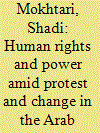

|
|
|
|
|
| Summary/Abstract |
The stunning popular uprisings in the Arab world in 2011 inaugurated an era of protest, revolutions and political transitions, on the one hand, and heightened repression, civil war and renewed authoritarianism, on the other. During this era the human rights paradigm was often at the fore of political and social contests, repeatedly being claimed, co-opted and appropriated. This paper argues that within the Middle East’s uprisings and transitions, deployments of human rights had notable emancipatory effects; yet invocations of the discourse continued to emerge from, converge with or (re)produce various power-laden domestic and international political dynamics. The human rights paradigm served as a primary discourse of the most serious challenge to Arab authoritarianism and its Western sponsorship in contemporary history, with the outcome in Tunisia exemplifying its potential to influence both the processes and substance of genuine political change. The period’s events and ethos also created openings for rights claims to be made by marginalised groups and facilitated local actors’ agency in driving the region’s human rights politics and agendas after decades of ‘human rights in the Arab world’ being a discourse largely driven by foreign actors. Yet the paradigm was also frequently curtailed or instrumentalised by local rulers and Western powers clinging to longstanding authoritarian arrangements, as well as by emergent political actors vying for power.
|
|
|
|
|
|
|
|
|
|
|
|
|
|
|
|
| 8 |
ID:
139775
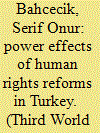

|
|
|
|
|
| Summary/Abstract |
While the perspective of ‘liberalism of fear’ assumes that human rights limit the despotic power of the state, this paper argues that human rights reforms promoted in the context of institution- and capacity-building programmes have had significant power effects by enhancing the disciplinary capacities of the Turkish state and blunting the transformative potential of rights claiming. The reforms increased state surveillance by rechanneling criminal justice processes towards producing evidence (such as telecommunications data, DNA collection, etc) rather than testimonies. Instead of limiting state power, these reforms enhanced the disciplinary mechanisms of social control. They depoliticised the problem of torture by constructing it as an occupational accident (as opposed to a state crime) that happens because of lack of police officer know-how or resources for the investigation of crime. Finally, reforms revamped the way police investigated crimes, rather than launching campaigns against torture and dismissing past wrongdoers in the police. The paper concludes that the neoliberal emphasis on the technicalisation of political problems has limited the democratic potential of human rights reforms.
|
|
|
|
|
|
|
|
|
|
|
|
|
|
|
|
| 9 |
ID:
139763
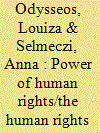

|
|
|
|
|
| Summary/Abstract |
The contributions to this volume eschew the long-held approach of either dismissing human rights as politically compromised or glorifying them as a priori progressive in enabling resistance. Drawing on plural social theoretic and philosophical literatures – and a multiplicity of empirical domains – they illuminate the multi-layered and intricate relationship of human rights and power. They highlight human rights’ incitement of new subjects and modes of political action, marked by an often unnoticed duality and indeterminacy. Epistemologically distancing themselves from purely deductive, theory-driven approaches, the contributors explore these linkages through historically specific rights struggles. This, in turn, substantiates the commitment to avoid reifying the ‘Third World’ as merely the terrain of ‘fieldwork’, proposing it, instead, as a legitimate and necessary site of theorising.
|
|
|
|
|
|
|
|
|
|
|
|
|
|
|
|
| 10 |
ID:
139773
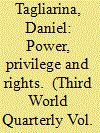

|
|
|
|
|
| Summary/Abstract |
Much of the scholarship on how marginalised groups deploy human rights discourse focuses on how these groups translate human rights norms into the group’s vernacular. The marginalised are not alone in this respect. The American Christian Right employs the power of rights claims – which they have previously rejected – to preserve Christian privilege at the expense of greater religious inclusion. This paper demonstrates that even the ‘powerful’ need to vernacularise rights norms and ideals when the group has no meaningful history of engaging with rights and the law. This shared process of vernacularisation highlights the plasticity of rights, and how they can be bent to serve the relatively powerful or the relatively powerless.
|
|
|
|
|
|
|
|
|
|
|
|
|
|
|
|
| 11 |
ID:
139768


|
|
|
|
|
| Summary/Abstract |
Human rights have become a central aspect of global peace-building strategies, and are often pursued through instruments of transitional justice. In this paper I focus on the role of truth and reconciliation commissions (TRCs) for human rights in post-conflict settings and argue that the global politics of reconciliation, which is supposed to unveil the ‘truth’ about, and help to overcome, past human rights violations, serves as a vehicle that brings the human rights language to post-conflict settings. While this might be expected to be empowering for the local people, the Sierra Leonean case suggests that, here, the particular human rights narrative promoted by the TRC had two potentially depoliticising effects: first, by narrating the past conflict as a series of human rights violations while downplaying the political motives and claims that kept it going; second, by constituting the local people as the victims and perpetrators of past human rights violations who are above all in need of reconciliation and healing. The TRC’s human rights narrative thereby overwrote other subject positions held by the people, such as those of soldier, rebel, or civilian. It also neutralised the political claims held by these subjects and replaced them with the therapeutic need for reconciliation and healing.
|
|
|
|
|
|
|
|
|
|
|
|
|
|
|
|
| 12 |
ID:
139776


|
|
|
|
|
| Summary/Abstract |
The Agreement on Trade-Related Aspects of Intellectual Property Rights (TRIPS) firmly enshrined a legal framework guaranteeing enforceable minimum intellectual property (IP) standards at the international level. But it also resulted in a greater inclusion of intellectual property rights (IPRs) in wider political debates between developing and industrialised countries – for instance on questions of global health and development. This paper argues that the increasing reach and efficacy of the IP regime has given rise to wider challenges to the IP system needing urgent conceptual analysis. The focus here is on IP’s increasing confrontation with the right to health, which is analysed not as an encounter of radically opposed legal systems, but as an ambivalent process in which the right to health operates as a challenge to the IP system – and, paradoxically, as an argument for its extension. To account for this ambivalence, the analysis develops a Foucauldian understanding of the right to health’s potential challenge, re-evaluating the right to health’s role as a part of a process of incremental realisation of governmental priorities, which negotiates tensions between guaranteeing the function of the economy and improving the health of populations. While this incremental process draws attention to the limitations of the right to health’s potential to challenge the IP regime, it also highlights this regime’s difficulty in accommodating a wider range of active entrepreneurial subjects.
|
|
|
|
|
|
|
|
|
|
|
|
|
|
|
|
| 13 |
ID:
139764
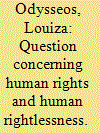

|
|
|
|
|
| Summary/Abstract |
In the midst of concerns about diminishing political support for human rights, individuals and groups across the globe continue to invoke them in their diverse struggles against oppression and injustice. Yet both those concerned with the future of human rights and those who champion rights activism as essential to resistance, assume that human rights – as law, discourse and practices of rights claiming – can ameliorate rightlessness. In questioning this assumption, this article seeks also to reconceptualise rightlessness by engaging with contemporary discussions of disposability and social abandonment in an attempt to be attentive to forms of rightlessness co-emergent with the operations of global capital. Developing a heuristic analytics of rightlessness, it evaluates the relatively recent attempts to mobilise human rights as a frame for analysis and action in the campaigns for justice following the 3 December 1984 gas leak from Union Carbide Corporation’s (UCC) pesticide manufacturing plant in Bhopal, India. Informed by the complex effects of human rights in the amelioration of rightlessness, the article calls for reconstituting human rights as an optics of rightlessness.
|
|
|
|
|
|
|
|
|
|
|
|
|
|
|
|
| 14 |
ID:
139765
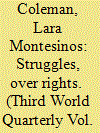

|
|
|
|
|
| Summary/Abstract |
What should we make of appeals to human rights in the context of struggles against dispossession or armed repression? After the ‘death of man’ as transcendent ground of all right, critics have highlighted the disciplinary effects and absolutist tendencies of human rights discourse. However, attempts have been made to ‘rescue’ human rights – and wider forms of humanistic advocacy – as an immanent, self-grounding ethical practice. Drawing on analysis of struggles over natural resource extraction and indigenous rights in Latin America, this paper argues that such accounts mirror the assumptions of a predominant mode of international humanitarian activism. By reifying humanistic ideals, without sufficient attention to the effects of practices within which rights are invoked, both obscure entanglements between humanist interventions and logics of dispossession. This is particularly significant at the current juncture. Through these interventions rights have been absorbed into a neoliberal regime of truth in which the subjects of rights are interpellated as parties to private contract, such that rights themselves become tools of exception. Taking struggle as a starting point, by contrast, highlights not only the indeterminacy of rights but also the potential of human rights discourse to disrupt these logics. Through ethnographic engagement with ‘people’s hearings’ into ‘Multinational Corporations and Crimes against Humanity’ in Colombia, I revisit the questions of ‘the human’ and ‘rights’ and propose a more dialectical approach to the relation between normative principle and immanent critique.
|
|
|
|
|
|
|
|
|
|
|
|
|
|
|
|
| 15 |
ID:
139766
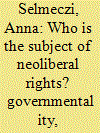

|
|
|
|
|
| Summary/Abstract |
Motivated by the litigious politics of the South African shack-dwellers’ movement, Abahlali baseMjondolo, this paper enquires into the knowledge dynamics implied by the governmentality literature’s take on the (neo)liberal deployment of (human) rights. It suggests that by implicitly constructing the freedom of codified rights as illusionary and opposed to the reality of neoliberal rationalities of government, this scholarship posits a cognitive hierarchy between agents of government and the governed, and thus reproduces the power dynamics that it seeks to criticise. Interweaving a presentation of Abahlali’s self-articulation as knowledgeable and rightful subjects with Jacques Rancière’s notion of ‘literariness’, the paper accounts for codified rights’ potential to enable the disruption of such dynamics, and traces the governmentality literature’s suspicion towards this potential back to its textual methodology.
|
|
|
|
|
|
|
|
|
|
|
|
|
|
|
|
|
|
|
|
|